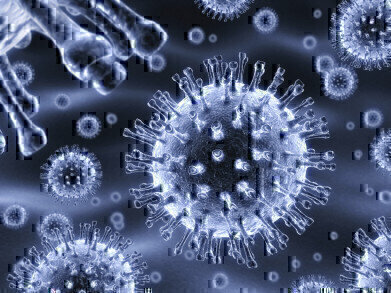-
 Flu Virus
Flu Virus
News
Virus Restriction - Huge Potential for Protective Coatings
Mar 22 2016
Scientists at biotech company Virustatic and the University of Manchester have developed a coating technology that can isolate viruses responsible for seasonal and pandemic influenza. Based on initial research carried out by Manchester’s Professor Sabine Flitsch, who has been working with the company since 2010 with EPRSC funding, the biochemists have developed a way to anchor proteins to different substrates in order to utilise their properties against viral attack.
Having identified specific glycoproteins with carbohydrates attached to the surface which could be configured to mimic the carbohydrate structures on the surface of the cells in the human oesophagus and nasal passages, the team then tested different materials to fix the glycoprotein to substrates, initially using activated carbon cloth, then using cheaper, simpler materials such as cotton.
According to the team the anchored and stabilised protein was found to have captured over 99% of flu viruses that came into contact with it; being cheap and easy to produce, it could be added to filters in masks, or air filtration systems. Work is also ongoing to further develop the technology so it can capture other potentially deadly pathogens such as Middle East Respiratory Syndrome (MERS) and Severe acute respiratory syndrome (SARS).
Dr Ian Rowles, from The University of Manchester, EPSRC funded Knowledge Transfer Fellow for the project said: “This has been an exciting collaboration with Virustatic and our research does indeed show that this technology can slow the spread of flu viruses. We hope that eventually, we’ll be able tackle all pathogens by using this technology. So watch this space.”
Inventor and Virustatic’s Technical Director, Paul Hope, said: “We’re very excited about this technology, which could have an important impact on some of society’s greatest challenges. It’s a whole new preventative approach to disease and if implemented could be transformative.”
“The underlying technology using our body’s natural proteins to capture pathogens, although well researched, has not been exploited to produce products that can prevent disease and alleviate infection because there has not been a method of anchoring them to substrates,” Paul told Labmate UK & Ireland. “We have patented a method of anchoring these proteins and we have a four stage, four year research and development program we are evolving with Manchester University to deliver prototypes in disease prevention and infection control. These product prototypes will be the first step in redesigning an affordable new response to infection prevention and control and we would like to form relationships with potential companies that could bring them to a global market.”
The company is also working on production of blood filter membranes that could remove viruses before they can cause damage including blood borne viruses that can cross the placenta and affect the foetal neural system. “We intend to develop and prototype a number of products including anti-viral membranes for a blood transfusion bag, antiviral and antibacterial CVV (continuous vein to vein) and CAV (continuous vein to artery) Membranes,” Paul Hope added.
Digital Edition
Lab Asia Dec 2025
December 2025
Chromatography Articles- Cutting-edge sample preparation tools help laboratories to stay ahead of the curveMass Spectrometry & Spectroscopy Articles- Unlocking the complexity of metabolomics: Pushi...
View all digital editions
Events
Jan 21 2026 Tokyo, Japan
Jan 28 2026 Tokyo, Japan
Jan 29 2026 New Delhi, India
Feb 07 2026 Boston, MA, USA
Asia Pharma Expo/Asia Lab Expo
Feb 12 2026 Dhaka, Bangladesh


















